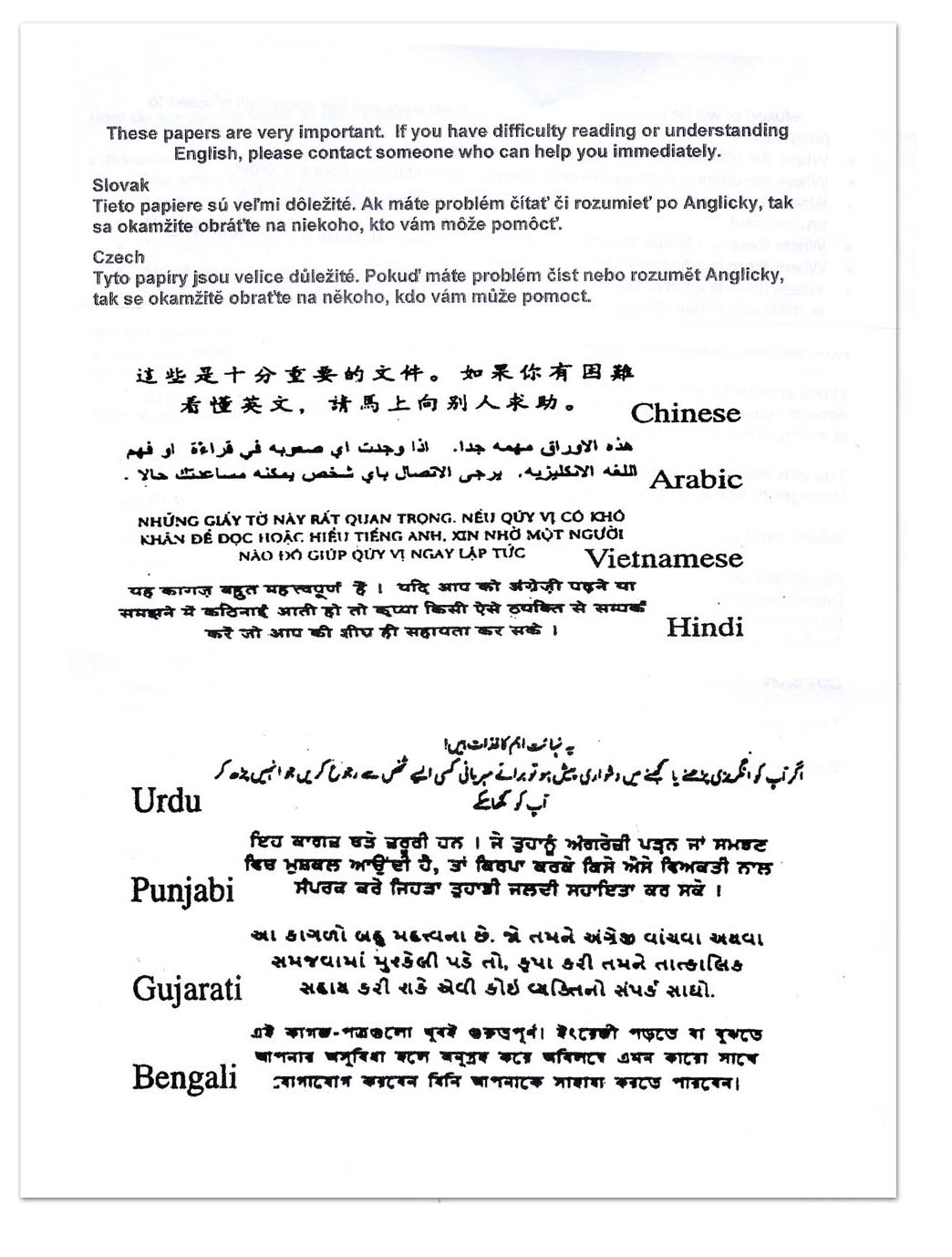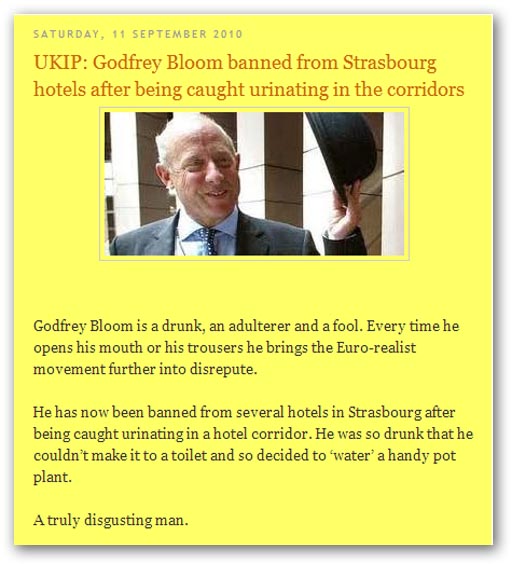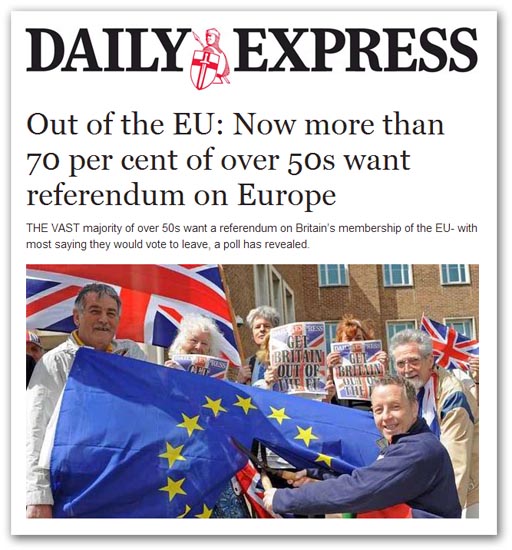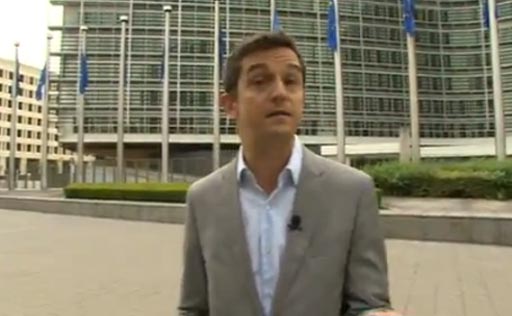UKIP: picking at a sore
Saturday 24 August 2013
However, even under the uncritical eye of Sarah Rainey, the oaf Bloom comes over as a lout, a braggart and a bully. But, in the piece itself, there is no serious – or any – attempt to rehearse the issues Bloom supposedly stands for. While the legacy media picks at the sore, the man has become the story. Thus, as Your Freedom and Ours pointed out right at the beginning, far from bringing policy issue to the fore, Bloom is proving to be a distraction, diverting attention from issues rather than allowing them to be developed in a coherent – or any – manner. In the meantime, we see Dr Eric Edmond venture into the fray again, with the well-crafted observation that we can't all be wrong about Farage. Edmond has his own issues with Farage, but his observations bring to mind the complaints of David Campbell-Bannerman, the UKIP MEP who deserted to the Tories in May 2011. Bannerman is a particularly unsympathetic character, so what he has to say does not invoke a great upwelling of support. But the fact remains that a lot of what he had to say is mirrored by what Will Gilpin has had to say. In fact, there is a consistent pattern here. Given the chromic problems in UKIP, we see voices within the ranks convince Farage that "something must be done" to improve the management of the party. Farage steps back a few paces and someone is appointed to take on the job. Farage immediately goes into high gear, sabotaging every suggestion and initiative, making it impossible for the appointee to achieve anything. In frustration and despair, the appointee resigns (or is fired for non-performance) and complains to the media. The UKIP briefing machine goes to work, spreading the poison about the appointee, while Farage steps up to the plate to take charge again. Equilibrium is restored and the cycle starts all over again. Even an outsider such as Iain Dale can see this – a man not entirely unsympathetic to Farage, and certainly a man who cannot be described as having a "grudge" against him. "I like Nigel Farage and admire him", writes Dale, "but he continues to treat UKIP as his personal, private property and despite protesting that he has let go the control he has traditionally exerted, you get the feeling that he protesteth too much". He continues: "UKIP’s biggest problem has always been that it is nothing without Farage, but if he is to show true leadership he has got to allow other people to get on the with the job". Yet, the UKIP response throughout the recent weeks has been to fend off criticism without conceding any points, dismissing critics and demanding that they cease and desist. That is UKIP's stock answer to criticism, which means we simply cannot move on. We are no further forward than we were a couple of weeks ago and then we were no further forward than we were ten years ago. It is in fact almost exactly ten years ago that I stopped working for UKIP, and it is unsurprising that this personal anniversary should dredge up personal events for me. But if the events are in the past, the effects are not. Ten years ago, I was fighting against the EU from within the ranks of UKIP. Virtually every day since, I have continued the fight, the main differences now being that I am doing much the same work without a political platform and without a salary. And hardly a day goes by without these differences manifesting themselves in one way or another. If there is anything I resent, though, it is the ignorant commentariat which knows nothing of past events, and nothing of how grievously Farage abused his positions. Yet the charge me of holding a "grudge" and thereby seek to dismiss anything I say on UKIP – even to the extent of denying my right to comment on UKIP. Those who know what went on (and still goes on within the higher echelons of UKIP) however, acknowledge that, by and large, my criticism has been temperate and moderate. Even to call Bloom an oaf and a racist is nothing more than statements of fact. But UKIP's game is not about responding to criticism. Then as now, closed minds simply go on the attack, attempting to brow-beat critics into silence. But, after ten years, I am still here. In another ten years, if the added pig still functions, I hope still to be here. But I suspect UKIP might not be. Richard North 24/08/2013 |
Immigration: a matter of law and custom
Saturday 24 August 2013
 I am a white Englishman, born in London where, with no wind and stilled traffic, you might just hear the sound of Bow bells. I was taught English as a language, first to speak and then to read and write, and do tolerably well in my native tongue. I am a white Englishman, born in London where, with no wind and stilled traffic, you might just hear the sound of Bow bells. I was taught English as a language, first to speak and then to read and write, and do tolerably well in my native tongue.Thus, when my local council, in the country of my birth, communicates with me, I really do not need an attachment to the letter (pictured, click to enlarge) - a personal letter addressed to me by name, from a named official – telling me in ten different languages what to do if I don't understand what I have been sent. Neither do I need to see in the waiting room of my local hospital – an English hospital in an English city – garish leaflets printed variously in Hindi, Urdu, Punjabi, Gujarati and Bengali. Nor do I appreciate the irony that on the Indian sub-continent from where these languages emanate, there are so many different languages that no single Indian can speak them all. English is an official language, the language in which most official documents are published – including Supreme Court judgements. And there lies the cause of much of our ills and frustrations in this benighted country of ours. Much, for instance, has been said and will be said about the vexed subject of immigration, and there is rightly much resentment at the politicians who have so recklessly opened our borders and removed any vestige of effective controls. But many of the problems we now encounter arise not entirely from the presence of incomers, per se. We have dealt with waves of immigration before, and this country has a proud tradition of assimilating new people and absorbing their traditions. Not by accident has the curry transcended mere food and become an art form. The problems so often come about by the pusillanimous attitude of officialdom to immigrants, their pursuit of "multiculturalism" and their unwillingness to insist that they conform to our standards rather than the other way around. These are the officials who so thoughtlessly and unnecessarily attach leaflets in ten different languages to personal letters to native born Englishmen.  From the same stable, we get an insolent, 21-year-old "madam" turning up in a burkha at Blackfriars Crown Court, charged with intimidating a witness, and then refusing to remove her veil to allow her face to be seen. From the same stable, we get an insolent, 21-year-old "madam" turning up in a burkha at Blackfriars Crown Court, charged with intimidating a witness, and then refusing to remove her veil to allow her face to be seen.Her barrister, Claire Burtwistle, then has the nerve to tell the court the woman is not prepared to lower her veil while men are in the room. "In front of women, it is not an issue", she says. "It is simply men that she will not allow to see her face". The egregious Burtwistle goes on to suggest that a female police or prison officer could identify the defendant and confirm to the court that it is the same person as in the police arrest photos. Then we get the "multi-cults" nibbling at the edges. Prosecutor Sarah Counsell not only accepts this insult but even consents to it, as does the craven policeman in charge of the case. He says he is "content" that he recognised the defendant while she was hiding in her burkha. Fortunately, the judge is made of sterner stuff. He refuses to accept the affectation of this Muslim woman that her burkha is a religious necessity. It is not. Instead, he tells her that she must remove her veil before she can enter a plea. Judge Peter Murphy said the principle of open justice overrode the woman's "religious beliefs" – or, in this case, politically-motivated affectation - and warned there was a risk a different person could go into the dock pretending to be her. Unfortunately, the woman, resident in Hackney, east London, not so very far from where I was brought up, apparently cannot be identified for "legal reasons". This is a pity. Her name should be placed before the public so that she can be duly shamed for her insolence. But at least she got a tongue-lashing from Judge Murphy, doubtless delivered in the politest and most gentlemanly of tones, as he told her: "It is necessary for this court to be satisfied that they can recognise the defendant". He added: "‘While I obviously respect the right to dress in any way she wishes, certainly while outside the court, the interests of justice are paramount". This is how it should be. In this our England, the individual conforms to the rules or takes the consequences. As for immigrants, they too must obey our rules, and they must have regard to the sensibilities of the settled population. Most of all, it is for English officials, appointed under British law and paid in pounds sterling by British taxpayers, to uphold the laws and customs of this country. We do not appreciate them changing the ;laws to suit the immigrants. If they were more robust, and more conscious of the rights and sensibilities of the settled population, there would perhaps be considerably less friction. Mind you, it would have been better if our laws and customs been honoured in the first place, and our borders had not have been so recklessly opened. But, as long as there are men such as Judge Peter Murphy around, the battle is not yet lost. COMMENT THREAD Richard North 24/08/2013 |
EU referendum: assessing the odds
Friday 23 August 2013
That may not be the conclusion of the few newspapers that report a survey of 11,211 over-50s byPopulus on behalf of Saga but it is the logical conclusion from the finding that 73 percent want an "in-out" referendum on the EU and 65 percent wanted it before the general election, while 45 percent would be prepared to vote for leaving the EU in such a referendum. One can discount the calls for the referendum before the election – such are the usual meaningless fluff on which pollsters rely for their headlines. ComRes poll in January recorded 63 percent of its sample in favour of holding a referendum, down from the last poll fifteen months previously when 68 percent favoured a poll. Despite the one-time belief of Mathew Elliott and others, a referendum ain't going to happen before the general, and never was. It is not even on the political horizon, so it is pointless measuring sentiment, much less endorsing the idea, as Farage insists on doing. What is more important is the anti-EU sentiment – which is generally supposed to be higher amongst the over-50s than in some other sectors – particularly the "middle-aged". Here, from the strongest opponents we get 45 percent in support of leaving, compared with the 46 percent reported in an ICM poll in the Telegraph in May of this year. It was then that we were noting a "disturbing stability" in the polls which have barely changed for over a year, despite a "surge" in support for UKIP, the supposedly anti-EU party. But the polls here have long been telling us that immigration is more important to UKIP voters than Britain's relations with the EU. The BNP agenda is overshadowing the EU. As to "Europe", while one can play tunes with poll figures depending on whether renegotiation is offered, the crucial figure is the differential – between "inners" and "outers". In the current poll, with 45 percent wanting to leave, those who are content to remain in the EU stand at 33 percent, a mere 12 percent difference. In previous polls, we've seen 16-17 percent margins, themselves insufficient to overcome the status quo effect, so 12 percent is nothing to write home about at all. In the Mail, Saga group strategy director, Tim Pethick, offers a flash of candour by saying: "all is still to play for". For the Labour party, though, the game is more immediate, resting on a decision as to whether to match David Cameron's ploy and commit his party to a referendum, should it get into office. Ed Miliband, according to the Financial Times, faces growing pressure from shadow cabinet colleagues to resolve the issue, with next month's party conference slated as the venue to announce a policy change. Nevertheless, the calculus is not at all straightforward. As long as UKIP is taking a disproportionately high number of votes from the Tories, there is some electoral advantage in standing aloof from the EU debate, allowing the Tories and UKIP to thrash it out. Given the outbreak of foot and mouth disease in UKIP, however, the balance of advantage on the EU could start sliding towards the Tories, in which case Labour would need to "wrest the political initiative back from David Cameron", as the FT says. In this, there seems to be a considerable degree of speculation as to possible options, with suggestions that Mr Cameron should be pushed to hold a vote in 2014 or on election day in 2015 to "lance the boil" on the EU question. And just because it isn't going to happen doesn't mean Labour can't demand it, if there is political advantage to be gained from so doing. There have thus been discussions about whether Mr Miliband should call for a referendum in his keynote conference speech in Brighton on 24 September: "The idea was that it would be a truly eye-catching announcement", says one Labour frontbencher. The New Statesman, however, has stormed into the breach, telling Miliband that he would be would be "foolish" to waste the opportunity to gain publicity for other causes by making a referendum pledge the centrepiece of his address. While the EU is an issue that obsesses press proprietors and Tory backbenchers, the Statesmansays, it is not one that animates voters.
Citing the most recent Ipsos MORI issues index, it claims that just one percent regard it as "the most important issue" facing the country. Just seven percent think it to be one of "the most important issues", figures that mean it doesn't even make the top ten of voters' concerns (it is ranked 14th).
Arguably, here, the Statesman is missing the point. Where the two main parties are dismissed by so many voters as being the same, any issue that creates "clear blue water" between the them can confer considerable electoral advantage. Only if UKIP continues to savage the Tories on the issue is Miliband wise to stay out of the fray. If, as looks distinctly possible, UKIP continued to exploit every possible avenue it can find to expedite its own self destruction, does the Labour leader need to move in and neutralise what could become a significant Tory electoral advantage. As for an actual referendum, we need to count our blessings that, despite the enthusiasm of theDaily Express - today's editorial demanding that the politicians "let the people decide on the European Union" - there will be no immediate vote. The odds are still heavily stacked against us gaining a majority to leave the EU. On the other hand, if the Europhiles in Labour or elsewhere had any sense, they would be pushing as hard as they could for an early referendum. Allied with UKIP and the Express on this, they could neutralise the anti-EU movement for a generation. COMMENT THREAD Richard North 23/08/2013 |
BBC: bias reinforced by incompetence
Friday 23 August 2013
Thus does the all-knowing and do doubt well paid Mr Price tell us that, in most policy areas there is "co-decision" by the Council of Ministers (representing EU governments) and the European Parliament. This is the system of law-making where a proposal is tabled by the European Commission which then has to be approved by both the Parliament and the Council. Except that there is one minor problem. The "co-decision" procedure as described by Mr Price no longer exists. As we see from this archived web site: "One of the important changes introduced by the Lisbon Treaty (or the Treaty of the European Union (TEU) and the Treaty of the Functioning of the European Union (TFEU)) is the fact that co-decision becomes the 'ordinary legislative procedure' …". The actual procedure is spelt out here. This may look to be a small point, but it isn't. The "ordinary legislative procedure" is one of the most important and commonly-used legislative tool in the European Union system of law-making and the BBC, in a guide funded by its increasingly reluctant license payers, gets the name wrong. Mr Price hasn't caught up with the Lisbon Treaty. One might as a result ask what else Mr Price has got wrong, and there is plenty. For instance, he gets the procedural sequence wrong. Price suggests that a law is sent to the European Parliament first, where it is [or may be] amended, and thence it goes to the Council for them to have a turn, then back to the Parliament and so on. Basically, Price is offering a pastiche of the British system, and the exchange between the Commons and the Lords, which is not how the European Union system works.
In fact, the Commission proposal goes simultaneously to Council and Parliament. Each, in their different ways, they prepare their "common positions" which are then compared. Adjustments are made, but not in the way that Price describes. Then, if there is no agreement, there is trialogue procedure, where the two sides hammer out their differences.
Price has it that the Commission steps in and negotiates a compromise agreement. This is wrong. The Commission host the trialogue, but does not take part in the discussions. It has to be involved because it can effectively veto any agreement, so the parties keep each other informed. But the agreement is between Council and Parliament. To get it so wrong is to make really fundamental errors. Price quite obviously has only a slender grasp of the EU law-making system. And he does not stop there, adding errors of omission to his catalogue. "Often EU laws arise because national governments and MEPs tell the Commission that there is a need for them", Price says on his web page. "Public consultations, scientific research and impact assessments also feed into the legislation". In fact, by far the largest initiators of "proposals" for EU law are international standards-making bodies, our old friends UNECE, Codex and the like. Maybe it would have been complicated to have said this – and maybe not. We managed to do it in one short sentence. But Price doesn't even try. So there we have the state broadcaster presuming to inform us on aspects of how we are governed, and getting it wrong in important respects. Not least of the failures is the inability to arm the reader (or viewer) with the all-important vocabulary, such as "common position", with which it is so hard to follow proceedings in real life. With the BBC having got the very basics wrong, one now wonders what else it has got wrong – and will get wrong. And there we don't have to speculate a great deal. Whether it is calling a European Council a "summit" or failing to understand and report on the significance of Article 50 in the Lisbon Treaty (TEU), the BBC is a very poor and unreliable guide. Sadly, though, the broadcaster has prestige. Many people believe its flawed output. Many others, though are beginning to realise how shoddy it has become. The BBC is not just biased. It is also worryingly incompetent - and not just in its broadcasting. Its revenue collection is also shambolic. Thus, while it still demands its money, it is entirely unsurprising that people are increasingly reluctant to pay. COMMENT THREAD Richard North 23/08/2013 |
Saturday, 24 August 2013
.
Posted by
Britannia Radio
at
08:03
![]()

























